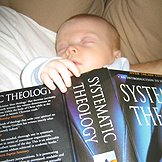 I've recieved several requests recently that I "lighten up" and stop writing about "such heavy theological stuff" etc., etc. So in an effort to "lighten" the "mood," consider this the gratuitous... uh... "mood-lightening" post for the month. Or something. Okay - that said, here are some things to brighten your day:
I've recieved several requests recently that I "lighten up" and stop writing about "such heavy theological stuff" etc., etc. So in an effort to "lighten" the "mood," consider this the gratuitous... uh... "mood-lightening" post for the month. Or something. Okay - that said, here are some things to brighten your day:1.) If you're jonesin' for some generally pointless, but entertaining, comedic blog relief, visit my ol' pal Diddy.9000 - from now on, I'll refer all you chuckle-seekers to his well-written accounts of the ongoing war against spider crickets. Also of light-hearted interest, he apparently thinks Adam Sandler is a better actor than Robert DeNiro. I take back the "ol' buddy" part. Now that I think about it, I'm not sure I know this guy at all. Do make sure you stop by and tell him what you think about that DeNiro biz though.
2.) Just as a promised, I did teach baby Caleb how to read (see photo). Unfortunately, he has a hard time holding Grudem's Systematic Theology up with his lil' baby arms, so after a couple paragraphs, he gets tired and takes a snooze. I guess we'd better start strength training next to build up those wee arms... or maybe I should just teach him how to read on his stomach.
3.) For my birthday, my bro sent me a copy of Taming A Liger: Unexpected Spiritual Lessons From Napoleon Dynamite. Pretty flippin' hilarious. You know I'm training to be a cage-theologian. Gosh.
4.) I'm sure you will be amused to know that Sam, the world's ugliest dog, died earlier this month. Okay, so that's not so light-hearted and funny... but what IS funny is that I know a guy named Sam. He's named just like the dog. The world's ugliest dog. Who... just... um... died. Ha. hmmm... (*sigh*)
5.) Did I mention that baby? Babies always make people laugh.
Whew! Now that we have this "light" and "funny" stuff outta the way, I can get back to some real bloggin'. Next topic - The Wages of Sin is Death... DEATH... DEAAAATH.


